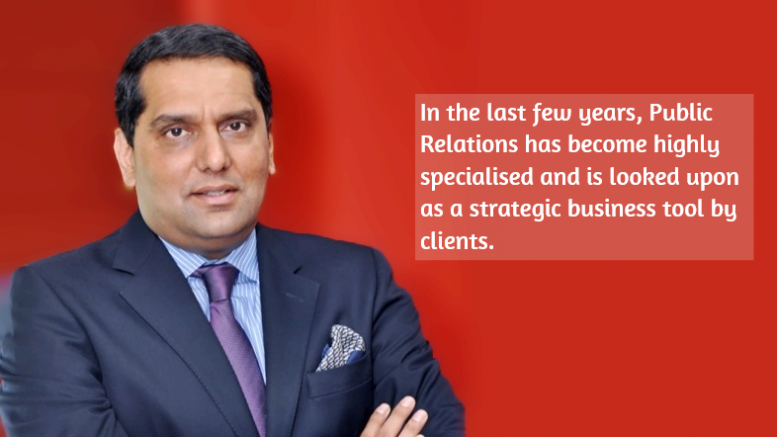For a writer, without any doubt, it is the encounter with intricacies of language that creates a fascination for words. The printed word has fascinated Nikhil Khanna, Founder and Executive Chairman, Avian WE since childhood, which extended to an interest in reading, writing, literature, poetry – anything that allows him to communicate better, to learn more, to be curious.
In a world, where most people feel secure in a job, Nikhil stood apart from the crowd. Having been bitten by the entrepreneurial bug, right from the beginning, he founded Friday Content Solutions, an information services company, which he sold in 2003. The turning point came in 2004, when he established Avian Media (now Avian WE), with just three employees and two clients.
Besides focusing on Avian’s growth, Nikhil set up Chase India, an associate company, in 2011 to work on public policy mandate for leading Indian and multinational companies. Under this wing is Avian’s dedicated investment in content, corporate social responsibility, digital and public affairs.
A throwback to the start of his career shows that his first stop was advertising; he was a copy writer. But since he didn’t particularly fancy writing adverts, he soon switched to PR and joined Good Relations, and the rest is history. Nikhil regularly writes for various publications like The Times of India, The Hindustan Times, The Telegraph, Outlook,Verve and Architectural Digest. He keeps a keen eye on the arts and was on the Advisory Board of the National Gallery of Modern Art in New Delhi.
In this freewheeling conversation with Shree Lahiri, Nikhil responds to the lure of words, tracks the entrepreneurial spirit that is dominant in his worklife, reveals why he has a keen eye on art, how he gives top priority to relationship-building and more.
RT: What led you to set up Avian Media in 2004?
I wanted to start a business of my own. I was tired of being told what to do by people who I thought didn’t quite add up. Some people have an issue with authority, and I’m one of those people. As it happens, matters converged (or conspired) in such a way that it became clear that it was time to branch off and do my own thing. Also, the last business I had started collapsed and that made me realise I shouldn’t be wasting time on things I have no interest in and instead, focus on something that gave me joy.
RT: Public Relations as a business has evolved over time. How would you describe the role of PR today compared to what it was a decade ago?
It’s dramatically different now; it’s far, far more professional with clients realising the value of having a professional to handle communications on their side. And then there’s the rapid and palpable convergence of PR, PA, analytics, content and digital which makes consultancies genuinely integrated with an ability to cross-sell.
RT: The emergence of digital media has had a huge impact on communication. How did your firm take up the challenges?
We started a new vertical. It’s called EXPD and began with a team of two people which has now grown to more than 25 very talented, go-getting people. They do more than just digital – they also produce short films, podcasts and radio spots.
RT: How did the merger of Avian Media with WE Communications come about?
We loved their culture, and they loved ours – the rest followed easily. It might appear cavalier and easy to say this, but matching cultures is of great importance. Their values matched ours. Also, the fact that they are independent was extremely important – we did not want to be part of a large conglomerate, which while could have its own advantages, also has an element of being vanilla and faceless.
RT: You started your career in advertising as a copy writer, and then switched into the world of PR. What led to you switching from Advertising to PR?
I didn’t enjoy copy writing. In PR, I could write, work with interesting clients and be close to the media, which is peopled with some of the brightest, most interesting individuals I have ever met.
RT: The printed word has fascinated you since childhood and this led to an interest in reading, writing, literature, poetry. Tell us something about this interest in order to kindle the same in younger professionals.
Knowledge is power and more so in this day and age. That, and the fact that I was always curious – still am – made me a voracious, almost greedy reader. A major part of the PR business now involves content as more and more people are asking for quality content. Content of quality will not and cannot be created unless people read. if you don’t read, you cannot write and if you cannot satisfy this most rudimentary aspect of the profession, then clearly you are in the wrong place. I’m tired of younger professionals who are ill-informed, lacking in curiosity and just happy to puddle along in a sea of mediocrity where lack of knowledge is seen as something to giggle about. It’s completely unacceptable. So, here’s my advice – ditch the phone and pick up three good books per month, any subject will do, be it art or literature or politics or business. But, read it thoroughly and enjoy it and see how much it will add to you.
RT: You are known to keep a keen eye on the arts and you were also on the Advisory Board of the National Gallery of Modern Art in New Delhi. What can Public Relations professionals learn from art?
To be discerning, to have acuity and a clear eye. Also, art teaches you to be a little crazy, to be bold and to take risks. And artists are so free!
RT: Your partnership with Nitin Mantri has been admired by peers. What goes into a successful partnership?
Patience, shared values and culture. One cannot stress the importance of all three. Plus, Nitin has reams of knowledge.
RT: Where do you see Avian WE in the next five years?
Thriving ever more. We’ve made very significant steps for integration and these steps will hopefully take the firm to a new trajectory.
RT: What is the road ahead for PR as a profession?
The road ahead is bright, but not without challenges. In the past few years, PR has become highly specialised and is looked upon as a strategic business tool by clients. As a result, PR pros today, more than ever, need to be knowledgeable regarding the overall industry that their clients fall into, and that is where the challenge lies. The younger lot is just skimming the surface and this trend is worrisome. We need to focus all our energies on closing this knowledge gap before it assumes catastrophic proportions.










Be the first to comment on "In Conversation with Nikhil Khanna"